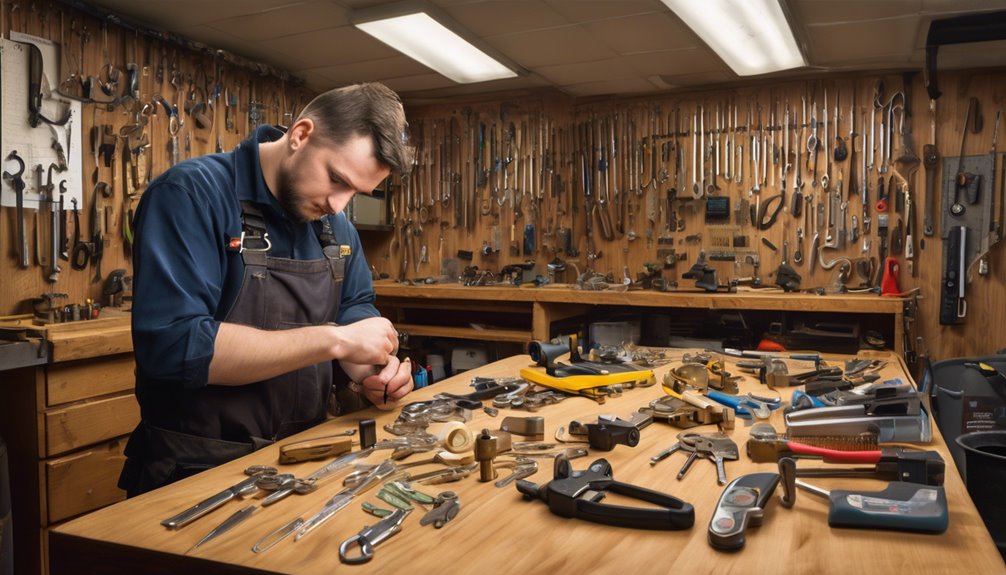Did you know that the locksmith industry is expected to grow by 7% over the next decade? If you’re considering a career in this field in Massachusetts, there are specific steps you’ll need to take. From understanding eligibility requirements to gaining practical experience, each aspect plays a vital role in your journey. So, what does it really take to succeed as a locksmith in this state? Let’s explore the path together.
Key Takeaways
- Be at least 18 years old and possess good moral character to enter the locksmith profession in Massachusetts.
- Consider enrolling in locksmith schools or apprenticeships for hands-on training and skill enhancement.
- Obtain professional certifications from organizations like ALOA to improve credibility and employment opportunities.
- Secure a local business license if planning to operate independently as a locksmith.
- Stay updated on local regulations and engage in continuous education to maintain competitiveness in the field.
Understanding the Locksmith Profession in Massachusetts

Understanding the locksmith profession in Massachusetts can be straightforward, especially since the trade is unregulated. This means you don’t need formal licensing to practice, but being at least 18 years old with a good moral character is essential.
While you can enter the locksmith industry without formal education, attending a locksmith school or completing an apprenticeship can greatly boost your skills and marketability.
Entering the locksmith industry lacks formal education requirements, but training through a locksmith school or apprenticeship significantly enhances your skills and marketability.
You’ll need practical abilities, including mechanical and mathematical skills, along with proficiency in using various lock-related tools.
As you navigate this field, building a strong online presence through a professional website and advertisements will help you stand out in a competitive market.
Embrace these opportunities to enhance your career prospects.
Eligibility Requirements for Aspiring Locksmiths
To become a locksmith in Massachusetts, you need to meet a few key eligibility requirements. First, you must be at least 18 years old.
While no formal education or training certification is required, having a solid moral and ethical background is preferred.
Don’t worry if you have a criminal record; it doesn’t automatically disqualify you from entering the locksmith business. However, you’ll need a state-issued or city business license to operate independently.
Although professional certifications aren’t mandatory, obtaining them can boost your credibility and improve your job prospects in a competitive market.
Steps to Complete Your Locksmith Training

While starting your journey to become a locksmith, it’s important to follow a structured training path that equips you with the necessary skills. First, enroll in locksmith schools or community colleges offering hands-on courses focused on key making, lock repairs, and installations.
These training programs usually last around 11 weeks and provide essential knowledge.
Consider obtaining professional certifications from recognized organizations like the Associated Locksmiths of America (ALOA) to boost your credibility.
Obtaining professional certifications from recognized organizations like ALOA can significantly enhance your credibility in the locksmithing field.
Remember, continuous learning is crucial; stay updated on new technologies by attending industry seminars and workshops.
Completing your training often opens immediate employment opportunities in locksmithing, or you could even start your own business or mobile locksmith service.
Taking these steps will set you on the right path!
Gaining Practical Experience in the Field
To gain practical experience as a locksmith, consider pursuing apprenticeship opportunities with established professionals in the field.
On-the-job training offers invaluable insights into real-world scenarios and techniques.
Additionally, networking with other locksmiths can open doors for mentorship and job placements, helping you shift from training to actual work.
Apprenticeship Opportunities Available
How can you gain the practical experience necessary to become a successful locksmith? One of the best ways is through apprenticeship opportunities available in Massachusetts.
These programs allow you, as an aspiring locksmith, to work hands-on with seasoned professionals, enhancing your skills and industry knowledge. Many local locksmith companies offer these apprenticeships, where you’ll learn the trade’s intricacies.
Completing an apprenticeship can considerably boost your job prospects since employers often favor candidates with practical experience. Depending on the complexity of skills being learned, these apprenticeships can last from several months to a few years.
Plus, networking during your apprenticeship can lead to job opportunities, as locksmiths often refer apprentices to potential employers or clients within their tight-knit communities.
On-the-Job Training Benefits
On-the-job training offers aspiring locksmiths a unique opportunity to acquire hands-on experience with a wide range of lock types and security systems. This practical experience is essential for developing your skills in real-world scenarios.
Working under a master locksmith not only enhances your technical abilities but also provides invaluable mentorship.
Here are some benefits of engaging in on-the-job training:
- Learn advanced techniques and troubleshooting methods directly from experienced professionals.
- Improve customer service dynamics and communication skills when interacting with clients.
- Stay updated with the latest innovations in security technology, keeping you competitive in a rapidly evolving field.
Completing on-the-job training will greatly enhance your job prospects and career advancement opportunities in the locksmith industry.
Networking With Professionals
While pursuing a career as a locksmith, networking with industry professionals can greatly enhance your practical experience and open doors to new opportunities.
Attend local trade shows, seminars, and industry events to meet experienced locksmiths and potential employers. Building connections with local locksmith companies can lead to valuable apprenticeship opportunities, where you’ll gain hands-on experience under seasoned experts.
Joining associations like the Associated Locksmiths of America (ALOA) provides access to networking events, educational resources, and peer support that can boost your career.
Don’t forget to utilize online platforms like LinkedIn for mentorship opportunities and insights. Engaging with local community colleges or vocational schools can also connect you with instructors and peers who share your aspirations in this field.
Certification and Licensing Considerations
When you consider becoming a locksmith, understanding certification and licensing is essential.
While Massachusetts doesn’t require a formal state license, obtaining certifications like those from the Associated Locksmiths of America can boost your credibility.
Plus, if you plan to run your own business, you’ll need a local business license, so it’s wise to check the specific requirements in your area.
Certification Options Available
To enhance your credibility as a locksmith, pursuing professional certifications can be a smart move, even in states like Massachusetts that don’t require a formal license.
Certification options available through organizations like the Associated Locksmiths of America (ALOA) can greatly boost your marketability.
Consider these valuable certifications:
- Certified Automotive Locksmith (CAL): Showcases specialized skills for automotive locks.
- Certified Master Safe Technician (CMST): Demonstrates advanced knowledge in safe and vault security.
- General Locksmith Certification: Covers a broad range of locksmithing skills.
Many training programs also prepare you for these certifications, ensuring you’re ready to excel.
Don’t forget that some employers may require a background check, so be prepared for that as you advance in your locksmith career.
Licensing Requirements Overview
What do you need to know about licensing requirements as you commence on your locksmith career? In Massachusetts, the locksmith trade is unregulated, so you won’t need a formal state license. However, you’ll still require a state-issued or city business license to operate. While specific training isn’t mandated, professional certifications can boost your credibility as a good locksmith. It’s also important to maintain a good moral and ethical background, as this is preferred in the profession. Staying updated on local regulations guarantees compliance and helps you succeed.
| Requirement | Details |
|---|---|
| State License | Not required |
| Business License | Required (state or city) |
| Training Certification | Not mandatory, but beneficial |
| Criminal Record | Not disqualifying, but preferred good |
| Local Regulations | Must stay informed |
Starting Your Own Locksmith Business

Starting your own locksmith business can be an exciting venture, especially in Massachusetts where the initial investment is relatively low.
You’ll need to obtain a state or city business license to operate legally. Here are some essential steps to take into account:
- Purchase necessary tools for your trade.
- Secure a professional business address.
- Market your locksmith business effectively online.
While Massachusetts doesn’t require a formal locksmith license, obtaining professional certifications can enhance your credibility and attract more clients.
Additionally, staying informed about local laws and regulations is vital for compliance.
The Importance of Continued Education and Networking
As the locksmith industry evolves, staying informed through continued education and networking becomes essential for your success. Continued education helps you keep up with the latest advancements in security technology, like smart locks and biometric systems, ensuring you remain competitive.
Attending industry seminars and workshops opens doors to valuable networking opportunities, connecting you with other professionals and potential clients. Engaging with trade associations, such as the Associated Locksmiths of America (ALOA), provides access to additional training and a supportive community.
Ongoing education can lead to certifications that boost your credibility, making you more attractive to employers and clients. Networking within the locksmith community fosters knowledge sharing and mentorship, guiding you through the industry’s challenges.
Frequently Asked Questions
How Long Does It Take to Learn to Be a Locksmith?
It typically takes around 11 weeks to complete formal locksmith training, but your journey doesn’t end there.
If you choose an apprenticeship, it could last several months to a few years, depending on your goals.
Online programs offer flexibility, letting you learn at your own pace, anywhere from a few months to a year.
Is It Worth Training to Be a Locksmith?
Imagine a key turning effortlessly in a lock, unfastening new opportunities.
Training to be a locksmith is definitely worth it. You gain valuable skills that set you apart in a competitive job market, leading to higher placement rates.
With hands-on experience, you’ll tackle real-world challenges and earn a solid income, often over $50,000.
Plus, ongoing education keeps you sharp in a field that’s always evolving. Your investment will pay off in more ways than one.
Do Locksmiths Make Good Money?
Yes, locksmiths can make good money.
You’ll likely earn a median annual salary of over $50,000, with hourly wages ranging from $20 to $30, depending on your region and services.
If you run your own business or offer mobile services, you might increase your earnings further.
Plus, as demand grows for advanced security systems, specializing in those areas could lead to even higher fees and job opportunities.
Do You Need a Certification to Be a Locksmith?
You don’t need a formal certification to be a locksmith, as the trade isn’t regulated.
However, getting certified can boost your credibility and marketability. Organizations like the Associated Locksmiths of America offer certifications that showcase your skills in specialized areas, which can help attract more clients.
Even without certification, completing a training program or apprenticeship can equip you with valuable skills, making you more competitive in the locksmithing field.








